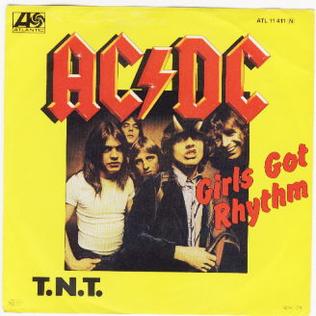Released: 25 July 1980Recorded: April–May 1980 Compass Point Studios (Nassau, Bahamas)
By 1979, AC/DC were poised to receive a significant level of success with their sixth studio album, Highway to Hell. Robert John "Mutt" Lange produced the record, making the band's sound more catchy and accessible to international audiences, and it became their first platinum album in the United States, selling over one million copies, while also peaking at number 17 on that country's pop charts and number eight in the United Kingdom. AC/DC, formed in 1973, first broke into international markets in 1977 with their fourth record, Let There Be Rock. They were notable for their high-energy live performances, in which lead guitarist Angus Young would don a schoolboy outfit, and singer Bon Scott's distinctive raspy voice. As the new decade approached, the group set off for the UK and France for the final tour dates of their breakthrough release. They planned to begin recording a follow-up shortly after its completion. On 19 February 1980, Scott went on a drinking binge in a London pub that caused him to lose consciousness, so a friend let him rest in the back of his Renault 5 overnight. The next morning, Scott was found unresponsive and rushed to King's College Hospital where medical personnel pronounced him dead on arrival. The coroner ruled that pulmonary aspiration of vomit was the cause of Scott's death, but the official cause was listed on the death certificate as "acute alcoholic poisoning" and classified as "death by misadventure". Scott was cremated and his ashes were interred by his family at Fremantle Cemetery in Fremantle, Western Australia. The loss devastated the band, who considered breaking up. However, friends and family persuaded them to carry on. After Bon Scott's funeral, the band immediately began auditions for a replacement frontman. Among the applicants were Gary Pickford Hopkins and Allan Fryer of Fat Lip, who, like Stevie Wright of the Easybeats, was touted by the press as most-certain replacements. At the advice of Lange, the group brought in Geordie singer Brian Johnson, who impressed the group. After the band begrudgingly worked through the rest of the list of applicants in the following days, Johnson returned for a second rehearsal. On 29 March, Malcolm Young called the singer to offer him the job, to his surprise. Out of respect for Bon Scott, the band wanted a frontman who would not be a mere imitator of him. In addition to his distinctive voice, demeanor and love of classic soul and blues music, the group liked Johnson's engaging personality. Johnson was officially announced as the new lead singer of AC/DC on 8 April 1980. Rehearsals for Back in Black were scheduled over three weeks at London’s E-Zee Hire Studios, but it was cut to one week when an opening came up at Compass Point Studios in Nassau, in the Bahamas. Although they preferred to record their next effort in the UK, there were no studios available, and the Bahamas presented a nice tax advantage. Back in Black was recorded from mid-April to May 1980 at Compass Point with producer "Mutt" Lange. Upon their arrival, the area was being hit by several tropical storms, wreaking havoc on the studio's electricity. In addition, their equipment was initially held up by customs, and other gear slowly was freighted over from the UK. Johnson felt pressure during the process, having never recorded with the group. None of Scott's writings were used for the album's lyrics, as the group felt it would seemingly profit from his passing. Instead, Johnson penned the album's lyrics and melodies, while the Young brothers composed the music. Lange focused particular attention on Johnson's vocals, demanding perfection out of each take. Near the end of the process, the band phoned manager Ian Jeffery in search of a bell to include on the album. Jeffery located a foundry to produce the bell, but with seven weeks having already gone by, he suggested Platt record a nearby church's bells. These recordings did not suffice due to the sound of a flurry of birds flying away at each bell hit. The foundry brought forward production on the bell, which turned out perfectly tuned, and it was recorded at Ronnie Lane's Mobile Studio. Following the recording's completion, the group mixed Back in Black at Electric Lady Studios in New York City.
Band members:

Brian Johnson – lead vocals (born 5 October 1947) Johnson's first band was the Gobi Desert Canoe Club. He was also in a band called Fresh. From 1970, Johnson played with cabaret/club band The Jasper Hart Band, performing songs from the musical Hair as well as soft-rock/pop songs of the time. He and other members of the band went on to form Geordie. His first and only solo single, "I Can't Forget You Now", he released also as a member of Geordie in January 1976 on the Red Bus label. In 1982, a compilation including only Geordie's 1973–1976 ten songs was issued as Brian Johnson's solo album Strange Man on the MCA label. ollowing Bon Scott's death, the remaining members of the band briefly considered quitting. They eventually concluded, however, that Scott would have wanted AC/DC to continue. Various candidates were considered for his replacement, including ex-Back Street Crawler vocalist Terry Slesser and Slade's Noddy Holder,who declined, before selecting Johnson. In March 1980 Johnson received a phone call inviting him to London to audition as the new vocalist for AC/DC. As a big AC/DC fan, he was happy to oblige.
Phil Rudd – drums
Cliff Williams – bass guitar, backing vocals
Angus Young – lead guitar
Malcolm Young – rhythm guitar, backing vocals
Benji Armbrister – assistant engineering
Bob Defrin – art direction
Barry Diament – mastering (original CD releases)
Robert Ellis – photography
Ted Jensen – remastering (EMI/Atco reissue)
Robert John "Mutt" Lange – production
Bob Ludwig – mastering (original LP)
George Marino – remastering (Epic reissue)
Jack Newber – assistant engineering
Tony Platt – assistant engineering
Brad Samuelsohn – mixing
https://www.youtube.com/watch?v=BGWm4ASP4zk
https://www.youtube.com/watch?v=7iF26wKF-_M










